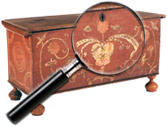Gaudy Dutch Earthenware
Gaudy Dutch is a soft-paste earthenware, or pearlware, made by British potteries for the American export market, especially the color loving “Pennsylvania Dutch”, from approximately 1800 to 1840.
The ware was polychrome decorated in imitation of the Japanese Imari porcelains in shades of red, black, blue, green and yellow. A variety of forms, including plates, cup-plates, coffee and teapots, sugar bowls and cream pitchers were made in sixteen patterns: Butterfly, Carnation, Dahlia, Double Rose, Dove, Grape, Leaf, “No Name”, Oyster, Primrose, Single Rose, Strawflower, Sunflower, Urn, War Bonnet and Zinnia. All these patterns display the characteristic of having underglaze blue as part of the design, augmented on-glaze by the typical Imari palette of green, red, orange, pink and yellow. Wares are rarely marked but Davenport, Enoch Wood & Sons and Riley marks have been noted.
Gaudy Dutch was succeeded by similarly designed wares on hard-paste or porcelain wares such as Gaudy Ironstone and Gaudy Welch, both decorated in darker shades with profuse applications of gilt highlights.
